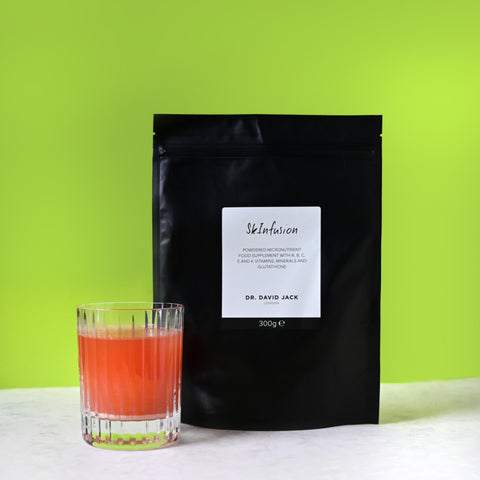Oral supplements for ageing skin
AUTHOR - DR. DAVID JACK
Over the past 40 or so years, the role of diet and nutrition in general health has become increasingly apparent, with strong links being discovered between certain diseases and poor dietary habits. The skin, like any other organ, is subject to dietary related effects. A better diet can improve skin health and age-related changes.
The science of skin ageing is an interesting and developing field, with significant advances being made over the past two decades. The beneficial role of antioxidants in skincare has been recognized for some time, but the role of oral antioxidants is an emerging and interesting field.


Numerous products claiming to have anti-ageing effects on the skin have reached the market in recent years. However, the evidence for their efficacy has been limited to only a few basic and subjective studies. In the same way that concentrated doses of oral medications for particular diseases have been refined and tested, it is likely that in future years we will see a refinement of oral supplements via ongoing research.
Currently, there is a fairly limited number of molecules that are used in oral skin supplements that have a substantial evidence-base supporting their use in supplements. These include vitamins, such as Vitamin C and Vitamin E, and other antioxidants, such as glutathione, as well as micronutrients. Such molecules are believed to have multiple roles in maintaining and supporting the creation of collagen and maintenance of skin barrier function.
With this in mind, let's explore some of the roles of various vitamins and other molecules present in the oral supplements in the Integrative Beauty range.
Vitamin A

Vitamin A is a group of fat-soluble polyunsaturated organic compounds deriving from both animal and plant sources.
In addition to their potent antioxidant effects, Vitamin A compounds also help with important immune functions.
Skincare with Vitamin A compounds has been shown to enhance repair of the skin following UV-related damage There is also evidence that Vitamin A compounds have beneficial effects when used in other skin conditions including acne and non-melanoma skin cancers. Vitamin A deficiency is associated with delayed wound healing
As mentioned above, Vitamin A is found in both animal and plant sources. There is substantial evidence for the use of oral preparations of Vitamin A in acne, however, the routine use of Vitamin A preparations for anti-ageing purposes requires more study.
Vitamin E

Vitamin E is also a fat-soluble vitamin known to have multiple important antioxidant effects in the skin, particularly related to UV damage.
Levels of vitamin E in the skin are a sensitive marker of damage – even with a single exposure to UV, skin levels can become depleted. Animal studies have demonstrated beneficial effects of Vitamin E supplementation, both directly onto the skin and orally.
Vitamin C

In the skin, Vitamin C has numerous antioxidant effects and interacts at multiple levels to reduce the effect of UV-related damage.
There is much interest in the combined use of vitamins C and E together in supplements. Although there are numerous skincare cosmetics containing both molecules, few are of sufficient concentrations and stable enough when exposed to light and air to be effective when applied to the skin. Could oral supplementation be a potential solution to this problem?
Vitamin D

The fat-soluble, cholesterol-derived Vitamin D has multiple important roles in skin physiology, including wound healing and immunity. Vitamin D3 has also been used to treat conditions such as psoriasis. Oral supplementation of Vitamin D has been used for many years and is recognized as a benefit in deficiency.
Glutathione
As one of the most potent antioxidants, and present in almost everybody cell, Glutathione has important effects on a wide range of physiological processes including DNA synthesis and repair. With ageing, it is known that Glutathione stores generally decrease throughout the body, so supplementation is proposed to have anti-ageing effects.
In the skin, Glutathione has important antioxidant effects and can influence melanin expression via a dose-dependent mechanism. The latter effect may have applications in the reduction of age-related hyperpigmentation.
Previously it was thought that oral ingestion of Glutathione does not result in increased plasma levels of GSH. But recent studies have suggested that orobuccal administration of ‘fast-slow’ release tablets (fast orobuccal absorption, slower gastrointestinal uptake) can produce elevated plasma levels, raising interest in oral supplementation of Glutathione as an anti-ageing skin supplement.
The emergence of oral supplements in anti-ageing is an interesting and developing field.
There is growing evidence supporting the benefits of a varied, antioxidant-enriched diet in ageing, supported by adequate macro-nutrients. It can be concluded that oral supplementation of antioxidants and even macro and micro-nutrients could have beneficial effects on skin ageing and repair.



